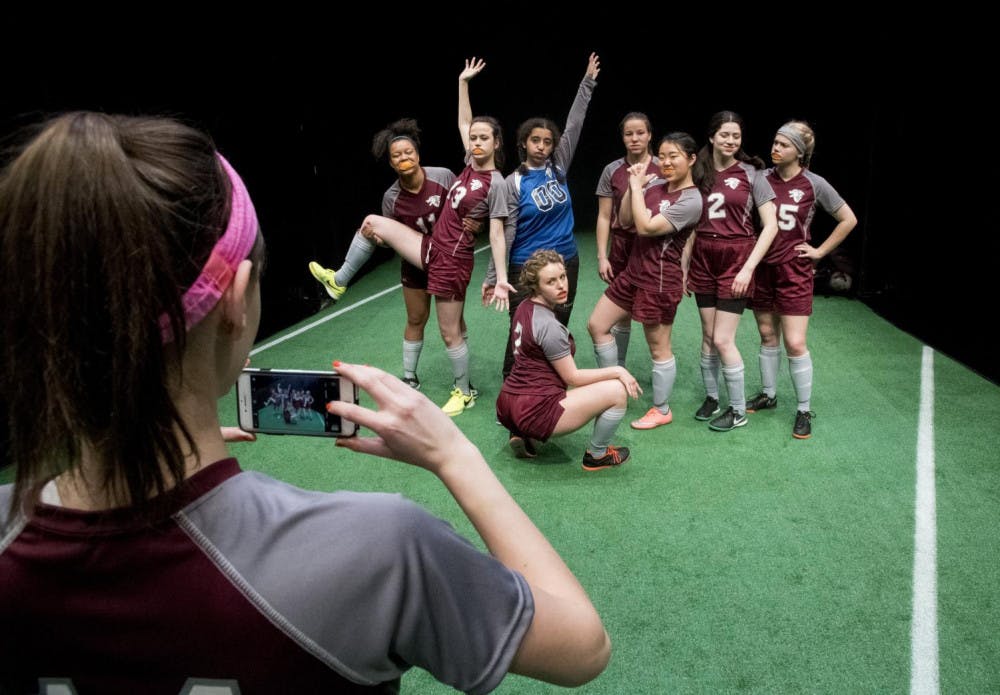From Thursday April 5 through Saturday April 7, the Department of Theatre and Dance presented “The Wolves,” a play written by Sarah DeLappe and directed at the college by Michole Biancosino.
The piece centers on the lives of teenage soccer players as they struggle through their indoor season and their tumultuous personal lives. The play only features female characters on the simple stage of the soccer field, but speaks to so much more than just the game.
“The Wolves” premiered in 2016 in New York City, where it was met with rave reviews and was a 2017 finalist for the Pulitzer Prize for Drama.
DeLappe wrote the piece in order to tell the story of girls as “human beings -- as complicated, nuanced, very idiosyncratic people who weren’t just girlfriends.”
In the work, she displays girls who are “athletes and daughters and students and scholars and people who [are] trying actively to figure out who they [are].”
The play is strongest in its honesty about what it is like to be a young woman surrounded by peers during a period of time where social interactions are so important.
The juxtaposition of the light-hearted chats and deep conversations that these girls have underscores relatability of the play and its characters.
Listening in on their discussions that range from atrocious genocides to their opinions about the timeless pads-versus-tampons debate are so familiar to many women that the work does not even seem like a play but more like watching real life unfold on stage.
DeLappe includes many aspects of teenage girls’ experiences in this play that are often ignored. These girls grapple with eating disorders, sexual harassment, social anxiety, the looming pressure of college, problems with parents and tensions amongst friends during times when their lives are constantly changing.
These narratives hit close to home for many women, so it is shocking to realize how revolutionary it is to see them highlighted as the main plot for a play.
At the heart of this piece are the relationships that these girls have with each other in various contexts. On one hand, they are teammates that work together in order to achieve their goal of doing well in their indoor season as well as their individual goals of playing college soccer.
The conflict between team mentality and personal ambition strikes hard at the dynamics amongst these girls and demonstrates their competitiveness and determination.
Additionally, these girls are not only teammates, but friends that have been together for many years. They clearly have a strong bond and know intimate details about each other that they take advantage of for laughs or, during conflict, for injury. These girls are at times immature and cruel to each other, whether unknowingly or on purpose. One of the characters, identified by her number 46 and played by Ursula Alwang ’20, is new to the team and is ostracized for her uniqueness and the fact that they think she lives in a yogurt (in reality she lives in a yurt). Seeing these challenging moments of bullying on stage reminds the audience of the pain that comes when girls do not support each other.
One of the most harrowing scenes of the play is when number 00, played by Hannah Mohamed Abdelaal ’21, has an anxiety attack. She comes onto the stage in tears and begins hitting soccer balls against the wall in frustration and panic. Unable to contain her emotions, she has to scream into her shirt in order to release all of the feelings she has been repressing.
This scene forces the audience to witness what many girls lock away and do not share with the world, that the struggles in their lives are sometimes too much to handle and everything comes to a breaking point.
At the height of their most divisive moments, the girls are forced to overcome tragedy. While they despair, they also find the opportunity to unite in ways that before the tension between them would not permit. They are able to recognize their shared strength once they relate to each other and see that they are all wrestling with the same pain.
The play ends with them chanting their cheer “We are the Wolves! We are the Wolves!” multiple times with increasing bravado. This unifying cheer signifies their growth as individuals that have the ability to come together and support one another, as the cheer is strongest when all of their voices form into one forceful sound. At the end of the cheer they break apart and look to the audience with faces of determination and confidence, demonstrating how their bond has allowed them to grow into strong women.
“The Wolves” shows what greatness can happen when women support each other. This play demonstrates the challenging issues that girls are forced to face in our society and the ways in which girls can relate to and help each other through dark times. The value of this work is that it exhibits the problems in our society that are so deeply ingrained but rarely talked about.
The play also inspires women to look at the power of the wolf packs that they take part in, whatever form they may be.
“The Wolves” Focuses on Sisterhood

Comments



